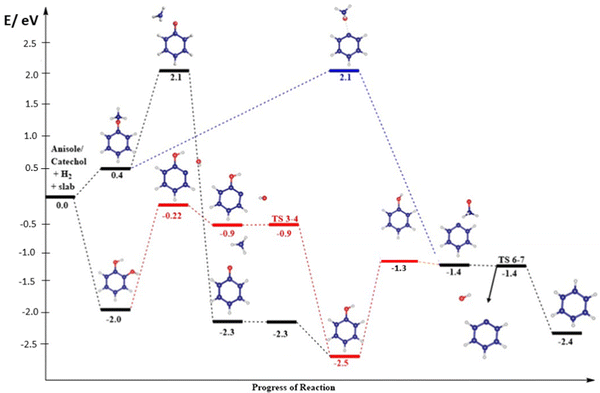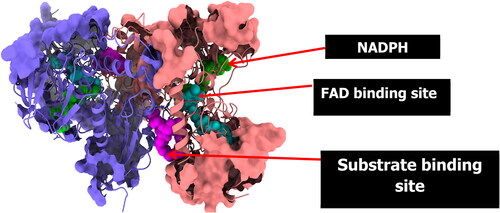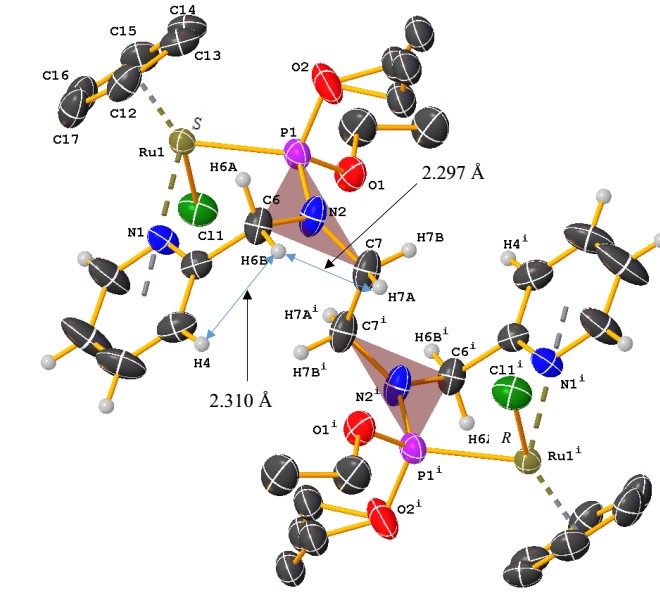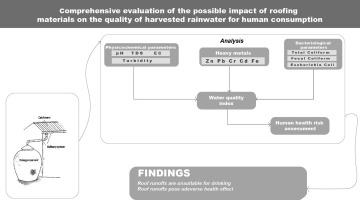Research

1. Computational Chemistry: Application and Development
The computational chemistry research in the department of chemistry focuses on the use of computational chemistry techniques to explore nature at the atomic and molecular levels, hence, the study of reaction mechanisms as an application of the techniques. Essentially, we explore reaction profiles & pathways. Another wing of computational chemistry research takes the path of method development. This involves scientific computing, programming and implementation of scientific concepts for fundamental research. The computing exploration here is geared towards the exploration of functional chemicals/materials for energy generation and their use will direct experimental efforts toward discovery. This will eventually reduce costs concerning money-spent-on-research and years of work. One of the most recent works done in computational chemistry is on the catalytic hydrogenolysis of compounds derived from guaiacol on the Cu surfaces. This is an application of computational techniques in the area of density functional theory that seeks to shed light on the hydro-de-oxygenation of phenolic compounds derived from oxygenated compounds guaiacol, C6H4(OH)(OCH3). The Adei, Borquaye and Opoku groups in the department have their research spanning this very challenging area of science. The Opoku research group is led Dr. Francis Opoku.
2. Exploration of new therapeutics

Chemical Biology and bio-physic research work are carried out in the department of chemistry as well and this is where the Borquaye research group in the department of Chemistry have their strong hold. The chemical biology work focuses on the exploration of the interactions of chemical entities with biological systems with the aim to understand the ensuing effects. The understating gained will potentially lead to the discovery of new therapeutics. The nature of this research is one that involves the study of natural products and untilizes a mix of both experimental and computational research. Some recent works involves a molecular docking and molecular dynamics studies in which simulations were run to evaluate some 30 antitrypanosomal natural products as potential inhibitors of trypanothione reductase, a key protein necessary for the survival of the Trypanosoma brucei.
3. Organometallics and Coordination Chemistry Research
The Department of Chemistry explores research in classical inorganic chemistry involving Coordination Chemistry and its associated Organometallics Chemistry. In these fields, we study the interactions between novel ligands and metals, using experimental/wet-bench chemistry techniques, (especially transition metals) to unravel the potential of the resulting new metal complexes for applications in homogeneous catalysis and metallodrug design. This is led by the Amenuvor research group. Dr. Amenuvor and his team explore homogeneous catalysis of biomass-derived molecules into value-added chemicals and liquid fuel and also, the interconversion of carbon dioxide for hydrogen fuel. Their research also focuses on the synthesis of well-defined complexes and investigating their anticancer properties. Recent works include an investigation into the antitumor effects of a novel ruthenium (II) complex on malignant melanoma cells. Nuclear Magnetic Resonance based techniques were largely employed in the study. Other works are being undertaken in this area where the investigations present the hope to delve much into the unknown. The Amenuvor Research Group is open to collaborations globally. Dr. Gershon Amenuvor can be reached via email on: gershon.amenuvor@knust.edu.gh.
More info on Dr. Amenuvor can be found here and research works here as well.
4. Environmental and Analytical Chemistry Research.
 Environmental and analytical chemistry research at the Department of Chemistry at KNUST is a multidisciplinary endeavor that focuses on studying chemical processes in the environment, including fields such as Toxicology and Ecotoxicology. Researchers in this domain play crucial roles in identifying and addressing environmental problems, developing strategies for natural resource management, and conducting ongoing monitoring of pollutants like heavy metals, pharmaceutical residues, and pesticides in various media such as soil, water, and food. This monitoring is essential for understanding the environmental impact of toxic substances and their processes in the interface between humans and their surroundings. The department's research in this domain emphasizes the origin and dispersion of environmental pollutants, human exposure, health hazards and ecotoxicology. One of the recent works from one of the involved research groups in the department is on a comprehensive evaluation of the potential impact of roofing materials on the quality of harvested rainwater for human consumption, providing insights into health hazards associated with roof runoffs and suggesting appropriate filters for treatment. Another research work is on an assessment of the potential of waste fish scales as feed for livestock. The department's active involvement in cutting-edge environmental chemistry research, including modeling future occurrences of these phenomena, underscores its commitment to addressing environmental challenges and contributing to the sustainable development of ecosystems and communities in Ghana. The Sheathe research group is a leader in this research domain. Other groups that are in this research domain are the Osei Akoto and Nkansah research groups.
Environmental and analytical chemistry research at the Department of Chemistry at KNUST is a multidisciplinary endeavor that focuses on studying chemical processes in the environment, including fields such as Toxicology and Ecotoxicology. Researchers in this domain play crucial roles in identifying and addressing environmental problems, developing strategies for natural resource management, and conducting ongoing monitoring of pollutants like heavy metals, pharmaceutical residues, and pesticides in various media such as soil, water, and food. This monitoring is essential for understanding the environmental impact of toxic substances and their processes in the interface between humans and their surroundings. The department's research in this domain emphasizes the origin and dispersion of environmental pollutants, human exposure, health hazards and ecotoxicology. One of the recent works from one of the involved research groups in the department is on a comprehensive evaluation of the potential impact of roofing materials on the quality of harvested rainwater for human consumption, providing insights into health hazards associated with roof runoffs and suggesting appropriate filters for treatment. Another research work is on an assessment of the potential of waste fish scales as feed for livestock. The department's active involvement in cutting-edge environmental chemistry research, including modeling future occurrences of these phenomena, underscores its commitment to addressing environmental challenges and contributing to the sustainable development of ecosystems and communities in Ghana. The Sheathe research group is a leader in this research domain. Other groups that are in this research domain are the Osei Akoto and Nkansah research groups.